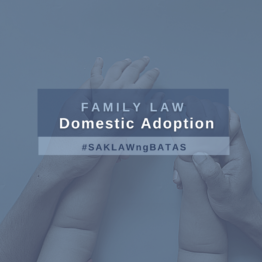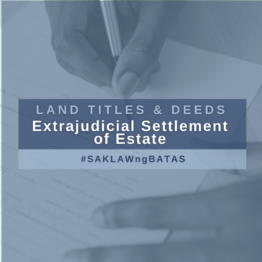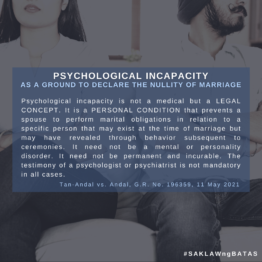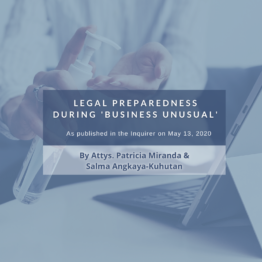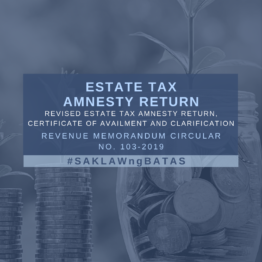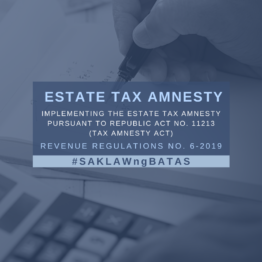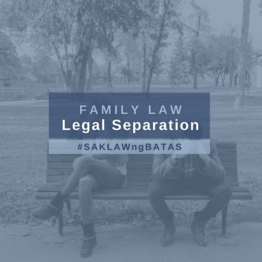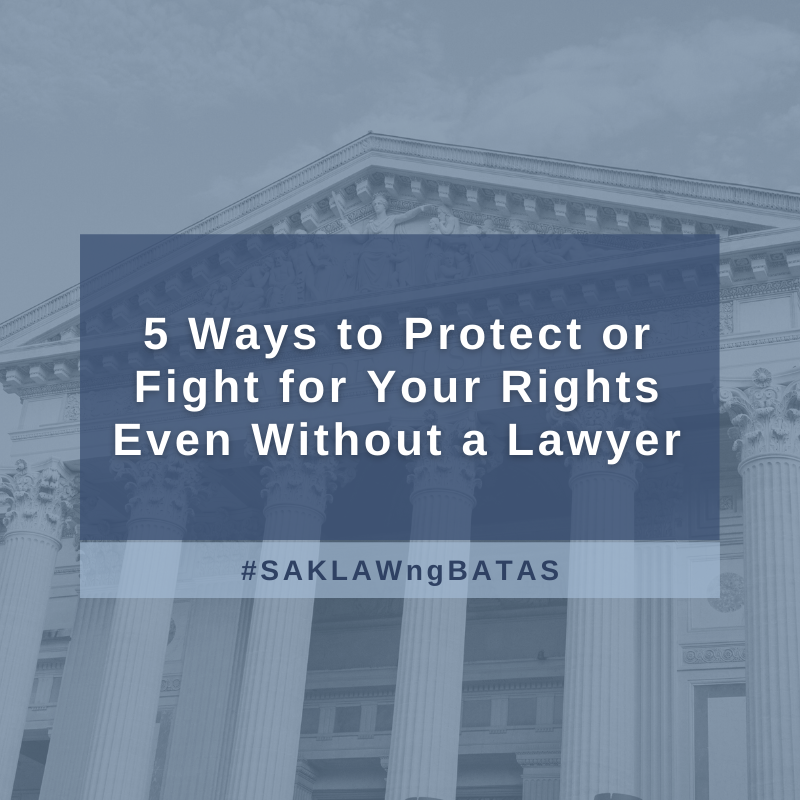
Do you sometimes find yourself asking, “Do I need a lawyer for this?”
There are a number of remedies available to you, wherein you may not need a lawyer to represent you in the beginning or throughout the proceedings, or you might even be prohibited from having a lawyer present.
In TV advertisements of non-prescription drugs, you will typically hear this: “If symptoms persist, consult your doctor.” It’s the same with lawyers. If problems persist, consult your lawyer.
In truth, it’s actually better if you consult your doctor first before taking any drug, even if it’s non-prescription. It is not safe to self-medicate.
In the same way, in going about judicial, quasi-judicial, or other official proceedings, it’s always better to consult a lawyer beforehand, or have a lawyer assist you throughout the process, so that you can fully appreciate and remain on top of the situation. It is always important to know your risks and to avoid doing something that could hurt you immediately or in the long run.
For example, there are some things that you might say that could incriminate you. You might decide to file a criminal case and if you lose, you may be slapped with malicious prosecution charges. You might be exposed to counterclaims and countersuits. There are also things that could simply hurt your case, making it ultimately unwinnable. And these are just some of the many things that you must watch out for. Simply put, it is not safe to self-litigate.
And so, as a lawyer, this article comes with a very important –
DISCLAIMER: IT IS BEST TO CONSULT AN ATTORNEY.
Remember that almost all (if not all) departments, bureaus, commissions, agencies, and instrumentalities of the government have some complaint mechanism for everything they regulate. There are offices that might have jurisdiction over the entity or person you want to file a complaint against and over the subject matter of your complaint, such as the Office of the Ombudsman, Anti-Red Tape Authority, Commission on Human Rights, National Privacy Commission, Securities and Exchange Commission, Bangko Sentral ng Pilipinas, Insurance Commission, Bureau of Immigration, and the list goes on. Look these up. You may consult an attorney to determine which one you should go to.
Meanwhile, the list I am providing includes some usual remedies that you may initiate or resort to even without a lawyer, and in some cases, are not even allowed to have a lawyer with you. Please note that this is not an exhaustive list, and I would be happy to learn more common remedies you know of, which are not included here.
Filing a Complaint with the Katarungang Pambarangay
You can go to the barangay and file a complaint. You are not allowed to have a lawyer with you during the proceedings before the lupon of the barangay.
The lupon of each Barangay has jurisdiction to amicably settle all disputes between parties residing in the same city or municipality, EXCEPT: (a) where one party is the government or any subdivision or instrumentality thereof; (b) where one party is a public officer or employee, and the dispute relates to the performance of his official functions; (c) offenses punishable by imprisonment exceeding one (1) year or a fine exceeding Five Thousand (PhP5,000.00) Pesos; (d) offenses where there is no offended party; (e) where the dispute involves real properties located in different cities or municipalities unless the parties thereto agree to submit their differences to amicable settlement by the appropriate lupon; (f) disputes involving parties who actually reside in different barangays of different cities and municipalities except where such barangay units adjoin each other and the parties thereto agree to submit their differences to amicable settlement by the appropriate lupon; and (g) such other classes of disputes which the President may determine in the interest of justice or upon recommendation by the Secretary of Justice.
Sometimes, the complaint you filed with the barangay is just a prelude or a condition before the filing of a case in court. Of course, by the time you have to go to court, you might need a lawyer to represent you there, unless you have a small claims case.
Other times, the lupon of the barangay might be successful in amicably setting your dispute.
Filing a Small Claims Case
You can go to court and file a small claims case. You are not allowed to have a lawyer with you during the court proceedings. You will have to fill out a Statement of Claim Form. Please check out more details regarding small claims cases here.
You can file a small claims case for matters that are purely civil in nature where the claim or relief prayed for by the plaintiff is: (a) solely for payment or reimbursement of sum of money owed under any of the following: contract of lease, contract of loan, contract of services, contract of sale or contract of mortgage; (b) for liquidated damages arising from contracts; and (c) the enforcement of a barangay amicable settlement or an arbitration award involving a money claim.
Please note that there is a threshold for small claims cases: PhP400,000.00 for Metropolitan Trial Courts (MeTCs); and PhP300,000.00 for Municipal Trial Courts in Cities (MTCCs), Municipal Trial Courts (MTCs), and Municipal Circuit Trial Courts (MCTCs).
Commencing a Labor Case
You can initiate a labor case with the National Labor Relations Commission (NLRC) even without your own lawyer. But you may be represented by a lawyer if you so wish. You will have to start the process by requesting the assistance of the Single Entry Approach (SEnA) Unit of the NLRC. The SEnA is an administrative approach focused on amicably settling labor issues or conflicts before they ripen into full-blown disputes or actual labor cases. Please check out more details here.
If an amicable settlement is not reached at the SEnA level, you might opt to file a complaint with the Labor Arbitration Branch of the NLRC. Before the pandemic, there is another round of conciliation proceedings before the Labor Arbiter, before the parties are required to file their respective Position Papers. During the pandemic, there have been some modifications to the usual process. You must have your own lawyer by the time you file your Position Paper, because there are some formalities and procedures that must be followed by that stage.
Obtaining a Barangay Protection Order for Violation of the Anti-Violence Against Women and Children Act
A Barangay Protection Order (BPO) refers to the protection order issued by the Punong Barangay, or in his absence the Barangay Kagawad, ordering the perpetrator to desist from committing acts of violence against the family or household members particularly women and their children. You may go to the barangay to obtain a BPO. You will be required to file a sworn affidavit accompanied by the affidavits of your witnesses, if any, and other evidence proving the alleged violation.
The barangay where you should file for a BPO depends on the parties’ residence, place of work, or place of study. As a rule: (a) where the parties reside, in the same barangay, the dispute shall be brought for settlement in said barangay; (b) where the parties reside in different barangays in the same city or municipality, the dispute shall be settled in the barangay where the respondent or any one of the respondents actually resides, at the choice of the complainant; (c) disputes arising at the workplace where the contending parties are employed or at the institution where such parties are enrolled for study, shall be brought in the barangay where such workplace or institution is located; and (d) any objection relating to venue shall be raised before the Punong Barangay during the proceedings before him. Failure to do so shall be deemed a waiver of such objections.
If the BPO is violated, you may then have to file a complaint with any MeTC, MTCC, MTC, or MCTC that has territorial jurisdiction over the barangay which issued the said BPO.
Filing a Criminal Case
You are not required to have a lawyer when you file a criminal case, but you may choose to have one assist you in the process. When filing a criminal case, you will have to prepare your complaint-affidavit accompanied by the affidavits of your witnesses and other evidence proving the alleged violation of a crime.
As a complainant, you are actually not required to know specifically what you should charge, although that would be helpful. What is important is that you set out the facts and provide the details and evidence necessary to enable the prosecutor determine that a crime has been committed and that the respondent is probably guilty of such crime and should be held for trial. The snarration of facts should be in an affidavit format, to be subscribed and sworn to before a prosecutor.
You may file a complaint with the prosecutor’s office directly. You may also file the complaint with the police, and then the police will be the one to endorse your case to the prosecutor’s office after investigation. The criminal complaint must be filed with the prosecutor’s office or the police having territorial jurisdiction over the crime committed.
When the case proceeds to trial, you may be represented by the public prosecutor. But you may also opt to hire your own private prosecutor, who will have to obtain authority from the public prosecutor, and who will be acting under the direct supervision and control of the public prosecutor.
Disclaimer: All of the information on this website is provided as general information, not as legal advice, nor as a solicitation for legal services. The information is not provided in the course of an attorney-client relationship between Atty. Salma F. Angkaya-Kuhutan and anyone who views it. Viewers should not rely on the information contained in this website when making decisions regarding legal matters but should consult a qualified attorney for legal advice. You should not act based solely on the information found on this website and are strongly advised to seek the legal opinion of a lawyer.
You may contact the Attorney through the information provided on this website if you are interested in the legal representation, counseling, and related legal services that we provide.

